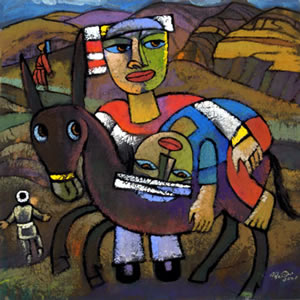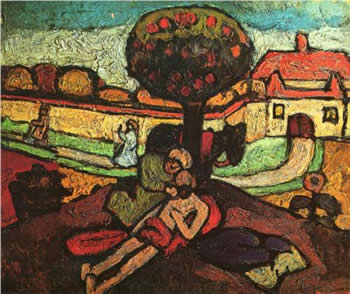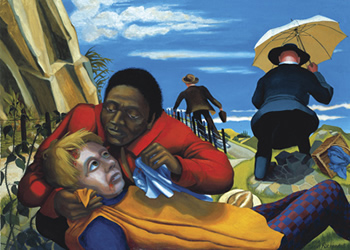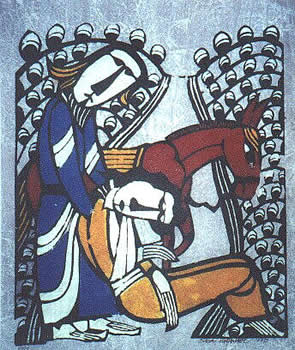"Go and Do Likewise"
The Parable of the Good Samaritan
For Sunday July 14, 2013
Lectionary Readings (Revised Common Lectionary, Year C)
Amos 7:7–17 or Deuteronomy 30:9–14
Psalm 82 or Psalm 25:1–10
Colossians 1:1–14
Luke 10:25–37
What is the kingdom of God like?
The kingdom of God is like a gay woman who transgendered into a man, and who then stayed with his lesbian partner. He attends church most Sundays with his adult daughter. They always sit in the front row, and if you take their seats, they'll tell you about it.
This isn't a feeble attempt at a modern parable. It's a true story.
 |
The Good Samaritan by He Qi. |
Would you welcome these people? Could you invite them to your church?
The kingdom of God shocks our sensibilities and bursts our boundaries. It subverts our sense of what matters most.
"We must ask what Jesus meant by his strange deeds and words," writes Garry Wills in his book What Jesus Meant. "He intended to reveal the Father to us, and to show that he is the only-begotten Son of that Father. What he signified is always more challenging than we expect, more outrageous, more egregious." Even if we found the "true and original" Jesus behind the gospel texts, says Wills, he would appear more rather than less incomprehensible to us.
In the kingdom of God, says Jesus, sometimes the right are wrong. Sometimes the bad are good. In the story of the good Samaritan, told only in Luke, Jesus outs the insider and exalts the outsider.
By the time of Jesus, Jews and Samaritans had hated each other for a thousand years. When king Solomon died in 931 BCE, the united monarchy split into two factions. Jereboam led a revolt of ten northern tribes and established a new capital in Samaria. The two remaining tribes of the southern kingdom of Judah maintained a capital at Jerusalem. The legacy of this split was a millennium of political rivalry, ethnic hostility, and religious bigotry.
Jews and Samaritans despised each other. The Samaritan woman at the well was shocked that a Jewish rabbi would even speak to her. “You are a Jew and I am a Samaritan woman. How can you ask me for a drink?”
 |
The Good Samaritan (1907) by Paula Modersohn-Becker. |
When a Samaritan village rejected Jesus, James and John wanted revenge: "Lord, do you want us to call fire down from heaven to destroy them?" It's not clear why, but one time Jesus told his twelve apostles not to go into any Samaritan village, but "only to the lost sheep of Israel."
But the parable of the Good Samaritan turns all these tables. Two religious professionals neglect a fellow Jew who was almost beaten to death, while a Samaritan was "moved with mercy" to help him.
Jesus shocks us with this story. This shock factor reminds me of what Flannery O'Connor said about the gratuitous violence and grotesque characters in her stories.
If your audience construes abnormal things as normal and vice versa, said O'Connor, the writer must take extreme measures. "You have to make your vision apparent by shock; to the hard of hearing you shout, and for the almost-blind, you draw large and startling figures." She admitted that her stories were hard, "but they are hard because there is nothing harder or less sentimental than Christian realism.’’
So Jesus shocks us with the oxymoronic "Good Samaritan." He does the same thing when he makes a Samaritan leper the hero in Luke 17: "Was no one found to return and give thanks to God except this foreigner?"
But that's not all Jesus intends. He doesn't merely shock us. There's no purpose in that. He wants to show us what living the life of God is like.
 |
The Good Samaritan by Dinah Roe Kendall. |
Luke writes that the religious expert "stood up to test Jesus" with a question. What must he do to inherit eternal life? This wasn't an honest inquiry; he wanted to trap Jesus.
When Jesus asks him what the Scriptures say, the expert in the law quotes the two "greatest commands" — Deuteronomy 6:5 about the love of God and Leviticus 19:18 about love of neighbor.
He answer was spot on. "You have answered correctly," said Jesus. Which is a scary reminder that being religiously right is a far cry from showing mercy. Knowing the good isn't good enough without doing the good. If you want to truly live, if you want to inherit eternal life, said Jesus, show mercy to your neighbor.
The expert deflects Jesus's response. Luke says that "he wanted to justify himself." He tries to limit his responsibility by defining who is or is not his neighbor. In that context, Jews and Samaritans would have treated each other as enemies and not neighbors. This effort at self-justification is a close cousin to self-righteousness; they're a recipe for spiritual death.
 |
The Good Samaritan by Sadao Watanabe. |
In telling the story of the Good Samaritan, Jesus flips the man's question. The right question is not, "who is my neighbor?" Rather, the right question is, "who acted like a neighbor?" Once again, the expert knows the right answer: "the one who had mercy." But the story ends here and we never learn if he moved from being right to showing mercy.
In his speech "I've Been to the Mountaintop," Martin Luther King, Jr. put it this way. "The priest and the Levite ask, 'If I stop to help this man, what will happen to me?' But then the Good Samaritan came by, and he reversed the question: 'If I do not stop to help this man, what will happen to him?'"
Jesus concludes: "Go and do likewise." Show mercy.
On Flannery O"Connor, see http://www.pbs.org/wnet/religionandethics/2009/11/20/november-20-2009-flannery-oconnor-redux/5077/
Image credits: (1) www.heqigallery.com (2) www.wikipaintings.org; (3) www.vocationnetwork.org; and (4) folk.uio.no.





